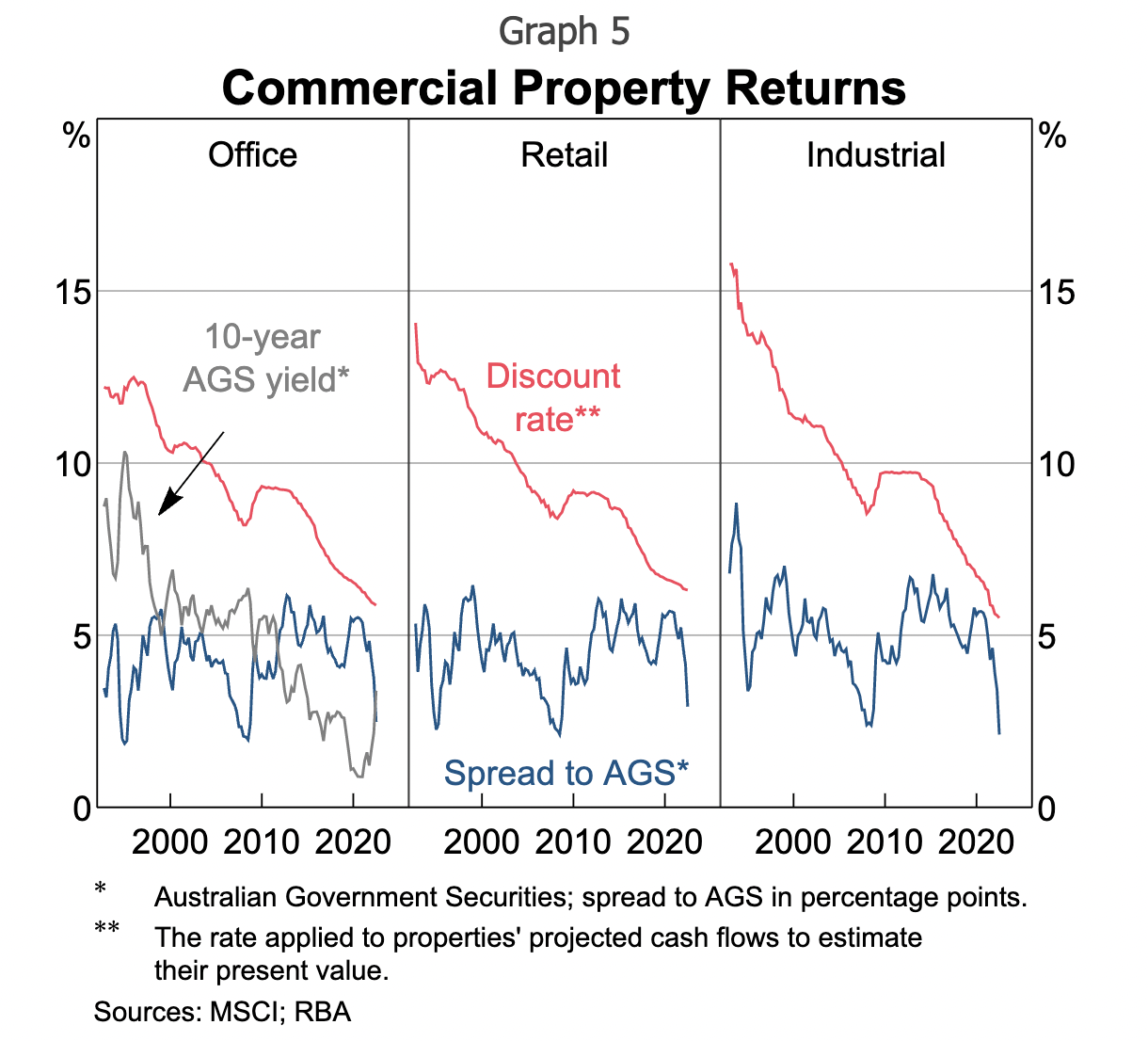Where the best yields will be found in commercial property
There has been no shortage of headlines and predictions for residential property prices in the last year. As late as January this year, CoreLogic data revealed that more than 300 Sydney suburbs had average house prices of well over $1 million. Oh how the tides have turned. The same CoreLogic data revealed that for the week ending Friday September 23rd, prices in the five major capital cities had recorded their 20th consecutive weekly fall.
But residential is not commercial, and no two properties are created alike. And as the Reserve Bank's Head of Domestic Markets Jonathan Kearns pointed out, the price falls aren't the same either. Commercial property has not seen the same veracity in declines that residential counterparts have - as the chart below demonstrates:

But Stuart Cartledge of Phoenix Portfolios argues the "cheque is in the post". He believes bigger falls are coming - but why and when can we expect a recovery?
In this edition of Expert Insights, I sit down with Stuart to discuss the environment for commercial property. From sifting through the headlines around bankrupt developers to understanding the state of rents, we cover a lot of worthwhile ground in under five minutes.
Note: This interview was taped Wednesday September 14th, 2022.
Edited Transcript
LW: Are commercial property prices about to fall as much as their residential counterparts?
Stuart Cartledge: Not yet, but I think the cheque is in the post. If listed rates are anything to go by, they are pricing in a downward move in asset values and unlisted pricing or the pricing of physical assets, which is kind of set by valuers to a large extent, isn't reflecting that yet. I think the issue we're seeing in residential is somewhat a function of the massive stimulus that was thrown at that market through a pandemic response with monetary policy and fiscal policy and all sorts of stimulus packages. What we're seeing now is the unwinding of that.
I think we'll see the same type of unwinding of the COVID-19 reactions to the commercial property over the next 6, 12, and 18 months.
LW: Describe the state of rents and tenant occupancy in the sector right now.
Stuart Cartledge: From best to worst, industrial is certainly a buoyant part of commercial property. We are seeing double-digit rent growth and industrial typically does not enjoy strong rent growth. You go literally decades with very little rent growth. Now we are seeing very buoyant conditions over the last 18 months.
There's been a demand shock and the supply is struggling to keep pace with that. Industrial properties are seeing double-digit rent growth, with very low vacancy. In retail, we certainly have seen a reset of rents, down a little. As leases come to the end of their term, whether a tenant renews or whether we get a new tenant, typically the new leases are being struck at lower levels than expiring rents, but not materially lower. Again, that's improved over the last 12 months.
In office assets, we've got double-digit vacancies across the nation. If you actually look at physical occupancy in Sydney and Melbourne is in the 50% range. It's still pretty disappointing. There's still this big reluctance to come back to the office.
LW: What does the downturn in property building activity do for asset values?
Stuart Cartledge: If you wind back to the February reporting season, one of the key features was listed property companies espousing the virtues of their development pipeline - how big it was and how significant it was going to be to future earnings.
Now we wind forward six months and those big development pipelines are still there. In some cases, they have committed development pipelines. This means there's financing in place and the construction will actually take place. But I think there's going to be a fair chunk of development pipeline that becomes next cycle stuff. There have been lots of news stories about builders in financial difficulty, to the extent that development slows down, ultimately that is good for existing stock, simply because of a supply-demand dynamic.
In many cases, listed or unlisted property owners are the ones that are pushing that supplier pipeline, even though it destroys potentially or at least diminishes the value of their existing assets. It's one of those conundrums.
Stockland (ASX: SGP), is an example of a company that doesn't have much in the way of office assets and therefore its pipeline of development of assets like Piccadilly and Sydney and North Sydney assets makes more sense for Stockland than it does for other assets or for other asset owners, whether say they've got a portfolio of existing assets to worry about.
About Cromwell Property Group
Cromwell’s property team actively manage all property assets in-house. We oversee the strategic management of all assets, ensuring that tenant requirements are met, space is leased, buildings are operating efficiently and projects are delivered on time and on budget. Click here to find out more about our products.

2 topics
1 stock mentioned
1 fund mentioned
1 contributor mentioned

